18.02.2007
On the 15th of February, 2007, a round-table "The cultural contexts of Central Europe: images, mithologems, reality" took place in the Hall of the Academic Council in the RSUH.
On the 15th of February, 2007, a round-table "The cultural contexts of Central Europe: images, mithologems, reality" took place in the Hall of the Academic Council in the RSUH. This activity opened the Festival of Arts of countries from Central Europe "M@NARCHIA". The aim of the festival, which will take place in the Central House of Artists in Moscow from 15th of February until 10th of March, 2007, is a holding of series of cultural activities - scientific program, exhibition project, concerts and cinema shows - which will be attended by scientists, writers, musicians and artists from Austria, Hungary, Italy, Poland, Ukraine and the Czech Republic.
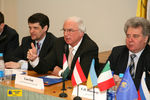
The round-table meeting was attended by the rector of the RSUH Efim I. Pivovar, Ambassador Extraordinary and Plenipotentiary of the Republic of Poland to the Russian Federation Jerzy Bahr, counsellor Embassy of the Czech Republic to Russia, director of the Czech Center to Moscow Tomash Glantz, first secretary of the Ukraine Embassy to Russia Igor S. Melnichuk, director of the Italian Institute for Culture Alberto Di Mauro, advisor to the Embassy of Poland to Russia, director of the Polish Cultural Centre Heronim Gralya, adviser to the Embassy of Hungary, director of the Hungarian cultural, scientific, information centre Ilona Kish. A welcoming part of the round-table was led by vice-rector for research of the RSUH Dmitry P. Bak.
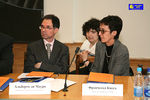
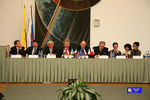
The rector of the RSUH, Efim I. Pivovar noted in his welcoming address the high scientific, educational and cultural importance of the Festival. The rector stressed that the mere fact of holding the round-table "The cultural contexts of Central Europe: images, mithologems, reality" at the Russian State University for the Humanities was not accidental. According to Efim I. Pivovar, the RSUH has a strong research base, which included a number of international research centers, a research center for studying of post-Soviet abroad countries, and actively cooperates with many educational and cultural institutions of Central Europe. The rector stressed the uniqueness of each region and at the same time the great importance of the cooperation for the formation of phenomenon called the "Central Europe". Efim I. Pivovar called to a comprehensive study of cultural features and cross-cultural integration and expressed confidence that the round-table encourages further research of Russian scientists and their foreign counterparts in this field.
Jerzy Bahr thanked the RSUH for organization of the meeting devoted to the comprehension of the experience for the interaction of different cultures in the Central European region. He expressed certitude that exactly the interest in the cultural traditions and achievements of other peoples, knowledge of history and features of the development of the neighbouring countries would reach a mutual understanding and integration.
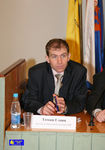
Tomash Glantz noted that one of the important task of the festival is an attempt to find out how the Habsburgs governing in the Austrian Empire, and then in Austria-Hungary, unifying many people, influenced at the cultural vector of Europe; what influence the general historical experience has rendered on the development of the modern Europe. According to Tomash Glantz the activity is a kind of intellectual provocation, calling think, to put questions and new ideas, and the round-table in the RSUH, which represents the scientific part of the Festival’s programme, is called to set the tone and determine the orientation of the following discussion.
Igor S. Melnichuk, in turn, expressed his confidence that the Festival "M@NARCHIA", and the round-table in the RSUH will promote the better relations between nations whose representatives are taking part in these activities. According to the first secretary of the Ukraine Embassy, the knowledge and understanding of the general past is one of the main conditions of neighbourliness.
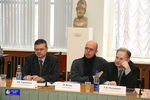
Alberto Di Mauro stressed that the round-table in the RSUH and other activities during the Festival stimulate reflections about the common roots of the culture of the European peoples, help set various cultural sectors, their peculiarities and mechanisms of interaction.
Heronim Gralya emphasized the key role of the RSUH in organizing the scientific part of the Festival’s programme. According to him, the university is the IHE (Institution of Higher Education) geared up for the widest cooperation with foreign educational and cultural institutions and organizations with foreign scientists; it’s allow the RSUH to be one of the leading Institution of Higher Education of humanitarian profile, that using actively the latest scientific achievements of other countries in the learning process and in scientific research.
Ilona Kish in her speech dwelled on the importance and relevance of a comprehensive study of the impact of the Habsburgs governing in Central Europe on the cultural, political and socio-economic development of regions, which had been a part of the Austrian power for a long time been.
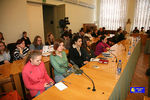
Summing up the welcoming part of the round-table, Dmitry P. Bak marked that the keen interest shown by both embassies and cultural centers in various countries, as well as domestic and foreign scientists, public and cultural figures, shows the relevance of the declared range of problems and the necessity of its in-depth and comprehensive examination. In connection with it he suggested to the participants of the round-table forming a cultural and public initiative “Central Europe”, which would unite interested in it representatives of countries belonging to the Central European region, or have had a great influence on its political, socio-economic and cultural development.
A part of the scientific round-table was properly anticipated with fragments of a unique demonstration of newsreel early XX century, representing various scenes from the Habsburgs life, Austria-Hungary and Russia Empires of that period. Director of the IHA RSUH Alexander B. Bezborodov, introducing newsreel, noted that the educational and scientific activities of the university first of all is based on work with different types of sources, that provides fundamentality of education, the depth and objectivity of research.
Within two scientific panels of the round-table that was led by Ph.D. in History, deputy director of the Institute for History and archives the RSUH in international activity Olga V. Pavlenko and D. of historical sciences, professor of the RSUH Leonid E. Horizontov; different aspects of political, economic and cultural interaction between regions and nations, which were part of the Austrian Empire and Austro-Hungary, were considered there. Among the main issues for discussion were the problems about transformation of images of the Habsburgs monarchy in the past and the present, mental maps of the monarchy, real and imaginary space on the territory of Central Europe and the dynamics their change over the time, the conflict communities within the Austrian Power, and also the issue about the internal and external borders in the cultural and historical context of Austro-Hungary.
The reports and messages on these issues were made by Olga V. Pavlenko, Tomash Glantz, Heronim Gralya, Leonid E. Horizontov, D. of history in Jagiellonski University in Krakow Henryk Glembotsky, associate professor of Czech literature of the division for Humanity research of Charles University in Prague Dr. Martin Putna, Ph.D. in History, the leading scientist at the Slavonic Institute, RAS Gennadiy P. Melnikov, etc.